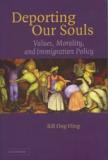Do the Right Thing,' He Says
These days, as I, a citizen by right of birth of the United States and Ireland, wheel my grandson, Navid, a citizen by right of birth of the United States and Iran, through my local shopping mall, I look about at people of all shades and shapes and combinations, wishing a world of justice and harmony for them, for me and for mine, and for my Navid. Obviously, I approach a book on values, morality, and immigration policy with considerable interest.
Bill Ong Hing, professor of law and Asian-American studies and director of the legal clinical programs at the University of California, Davis, begins and ends Deporting Our Souls with the same story and with the same message. He notes the intense arguments throughout the United States about the immigration situation and proposed policies to address it. He points out that the resistance to immigration and to immigrants is often steeped in hostility and hysteria, indeed in racism. Instead of real and metaphorical walls, he would have Americans meet the newcomers in their midst, even illegal aliens, with welcome wagons and parades.
Hing takes up the immigration issue under four main headings: worries about illegal immigration, the deportation of immigrants convicted of crimes, the legislative attack on family unification programs and the appeal to national security concerns in limiting immigration. Under each heading, he provides abundant information in the way of statistics, summaries of the relevant laws and proposed laws within a historical context, the pros and cons of the legislation, as well as many anecdotes that give flesh to his discussions.
The centerpiece of Hing’s chapter on illegal immigration is President George W. Bush’s proposal of Jan. 7, 2004, which attempts to thread a way between positions on the left (pro-immigration) and the right (anti-immigration). The critical aspect of the proposal was a new guest worker program and a way of regularizing current undocumented immigrants without granting amnesty. Hing himself is, on the whole, sympathetic to this plan, although he would favor a straightforward legalization policy. In his epilogue, he also makes clear that he opposes punishing those who cross the borders without documentation or those who help them, by denying benefits like food stamps to undocumented immigrants and penalizing those who employ them.
The book’s title, Deporting Our Souls, comes from the heading of the second chapter, on the treatment of even legal immigrants found guilty of criminal activity. Increasingly, federal law requires deportation of noncitizens who commit serious crimes, especially recidivists. Often the people deported have little or no knowledge of their countries of origin, and the proceedings against them occur years after the crimes committed, after spending time in prison and a thoroughgoing rehabilitation. It is here that Hing makes the most use of his storytelling ability to bring the reader to see the unfairness of this deportation strategy in many cases. What he calls for is a strategy that would take into account the real-life situations of the people who run into trouble with the law and the inadequate resources devoted to integrating immigrants, particularly refugees, into our society. In the case of refugees, we cannot simply admit and forget.
For decades, immigration policy had given preference to reuniting families. Although this preference remains in effect, it has come under criticism in the name of evenhandedness and economic utility. Why prefer someone’s parent or sibling instead of anyone else, especially instead of someone who would bring special talents to society? And if we give parents and siblings a preference, don’t we set up an unending chain of admission claims? Hing maintains that seeing immigrants as human beings means seeing them precisely as people who have flesh and blood relationships with others. Ignoring these relationships means treating people as isolated units.
Hing does not minimize national security concerns after the terrorist attacks of Sept. 11, 2001, but he believes that the key to addressing these concerns lies in a more open society rather than in a more closed and restrictive one. He points out that most of the 9/11 terrorists were in the United States legally and that the undocumented terrorists involved that day could be counted on one hand. An open society where people, even those here illegally, have identities through their workplaces, through driver’s licenses, through receiving schooling and health care, and where they feel respected by their neighbors and their government, would be a society with fewer of the grievances that lead to crime and terrorism and one in which there will be more cooperation in securing safety for everyone.
Deporting Our Souls does not, as the subtitle might lead one to think, sketch out a formal ethical theory. Hing makes the discussion of values and morality a part of his chapters on particular problems. Throughout he speaks out against dehumanizing and demonizing people who struggle to enter the United States with the same motives and desires as everyone else, and he calls for an approach to immigration that would balance the antiseptic justice of uniformity with a relational justice fit for human beings governing through and governed by policy.
I think that Hing is ethically on the mark in this informative book. My two criticisms would be, first, that he himself tends to demonize those who worry about the influx of undocumented immigrants and, second, that he has no plan for regulating the influx. A just and harmonious society will require good laws well applied; anything else will make for more conflict and injustice.
This article also appeared in print, under the headline “Do the Right Thing,' He Says,” in the November 6, 2006, issue.








